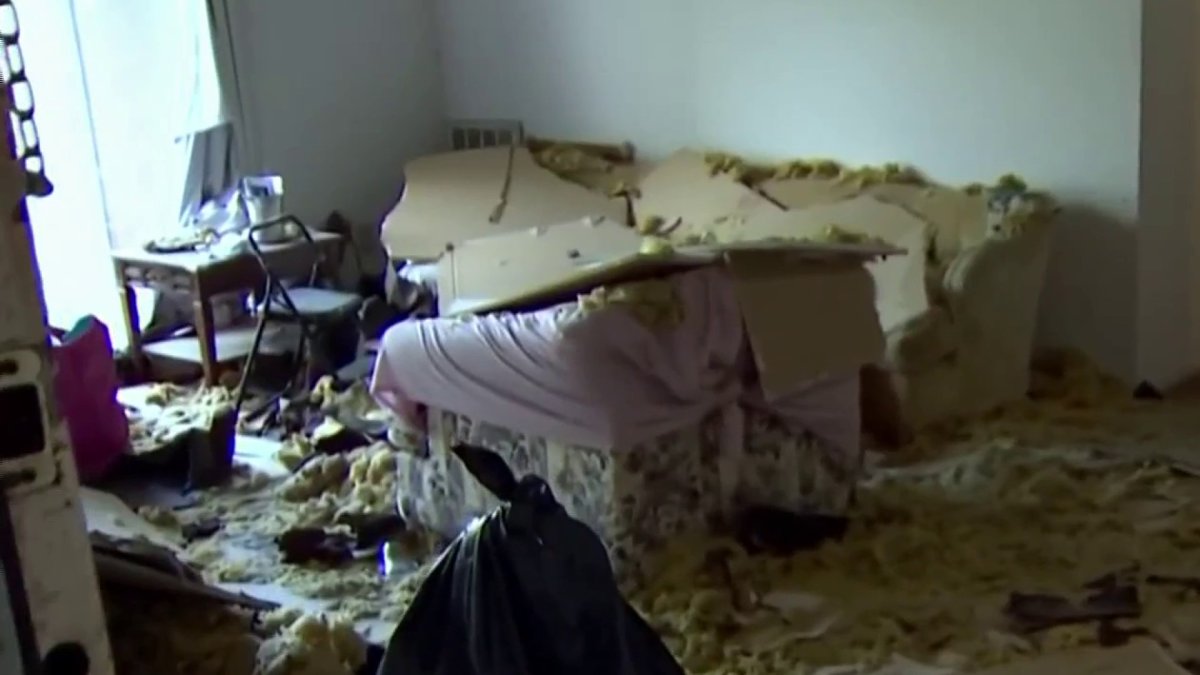
When the ceiling falls at a condominium, who's responsible? It's a battle one condo owner has been in for the past year.
"We're going into month 14 of the condo being in this condition," condo owner Merry Wiley said.
News4 first visited Wiley's top floor condo at Treetop Condominiums in Largo, Maryland, in April 2022, just a few days after the ceiling collapsed, trapping and injuring her elderly renter. A year later, it looks the same as it did then.
Wiley said nothing has changed, and her neighbors said nothing's changed for them next door or across the hall.
We're making it easier for you to find stories that matter with our new newsletter — The 4Front. Sign up here and get news that is important for you to your inbox.
Cynthia Lowry, who also lives on the top floor, said she's had warping floors for years.
"Merry lives next door to me, so usually what happens with her is going to directly affect me,” she said.
Across the hall, Dale Evans has holes in her roof and has been repairing the ceiling over and over. She said she’s paying for her own repairs.
Local
Washington, D.C., Maryland and Virginia local news, events and information
After News4’s report on Merry's cave-in in 2022, the condo association sent an email to tenants saying they had already hired a structural engineer to inspect her unit and had already started reviewing all the buildings.
The email obtained by the News4 I-Team said, "The engineer concluded that the issue with (Merry's) ceiling was the same issue that the Board had notified the community about in 2015 and 2018, that the ceiling drywall boards were attached with nails that were spaced too far apart." The email went on to say that’s how top floor condos were originally constructed in the complex.
After earlier incidents of collapsed ceilings, the condo association asked residents to look for cracks. Wiley said she did that.
"I find it difficult to believe that they would have built this building in a manner and not done every other building on the property in the same manner," she said.
After Wiley's incident, the county’s Department of Permitting, Inspections and Enforcement inspected and concluded ceiling drywall had become wet, causing the ceiling to fall.
According to a report obtained by the I-Team, the county inspected three of the four top apartments and found sagging ceilings and warped floors, all signs of water entry and penetration from the roof, and permits would be necessary for repairs.
After months of going back and forth with the condo association and management, Wiley filed a lawsuit for repairs in February.
In April, the condo association agreed to pay for repairs but only if she dropped the lawsuit, signed a confidentiality clause and didn’t talk to the media, meaning News4.
Wiley said she also was surprised to find out the condo was offering to make repairs since it had no permits to do the work.
“I found that not only did they not have permits, at no time did they put in the appropriate paperwork to request the permits,” Wiley said. “They had no permits in hand and none were pending."
Wiley and her attorney said they have tried to find out how many other top floor condos have had collapsed ceilings but have not been told. When the News4 I-Team contacted attorneys for the condominium, they told us they do not comment on pending litigation.
The I-Team checked with the Prince George's County Department of Permitting, Inspections and Enforcement, which wouldn’t talk on camera.
But the county did put a stop work order on the condo door and released a statement saying, "At this point, no proof of permits has been submitted to DPIE. Repairs may not start until the appropriate steps, as outlined to the HOA, have been followed."
Attorney Dwight Clark, who is not connected to the case, has represented both condo associations and owners for 35 years. He said agreeing to the terms the condo has presented to Wiley could be risky.
“Who knows what kind of work they did without the proper inspections from the county,” he said. “So, I would say, no, don't go that route.”
As for signing a non-disclosure agreement, Clark said, “I would definitely advise her not to sign anything like that, not to let them off the hook, because that's what they're looking for. They're looking for a way out and also to hire the work done without a permit.”
Because cases like this can be messy, he suggests people reach out to the Consumer Protection Division of their Attorney General's Office which is a free option.
"They usually hire an investigator, listens to both sides, and tries to mediate the situation,” Clark said.
Attorneys for the condo responded in Wiley’s lawsuit denying all liability and asked for a jury trial.
For now, her unit sits empty as she waits to see if she will ever be made whole.
Since the I-Team talked with Wiley, she received an update from the attorney for the condo’s board of directors, who said engineers they hired could not all agree on what made the ceiling collapse.
But they had approved repairs to be done to her ceiling and were awaiting access to her unit.
The I-Team checked back in with county inspections; they said the condo still has not requested the permits they recommended for the repairs.
Sign up for our Breaking newsletter to get the most urgent news stories in your inbox.